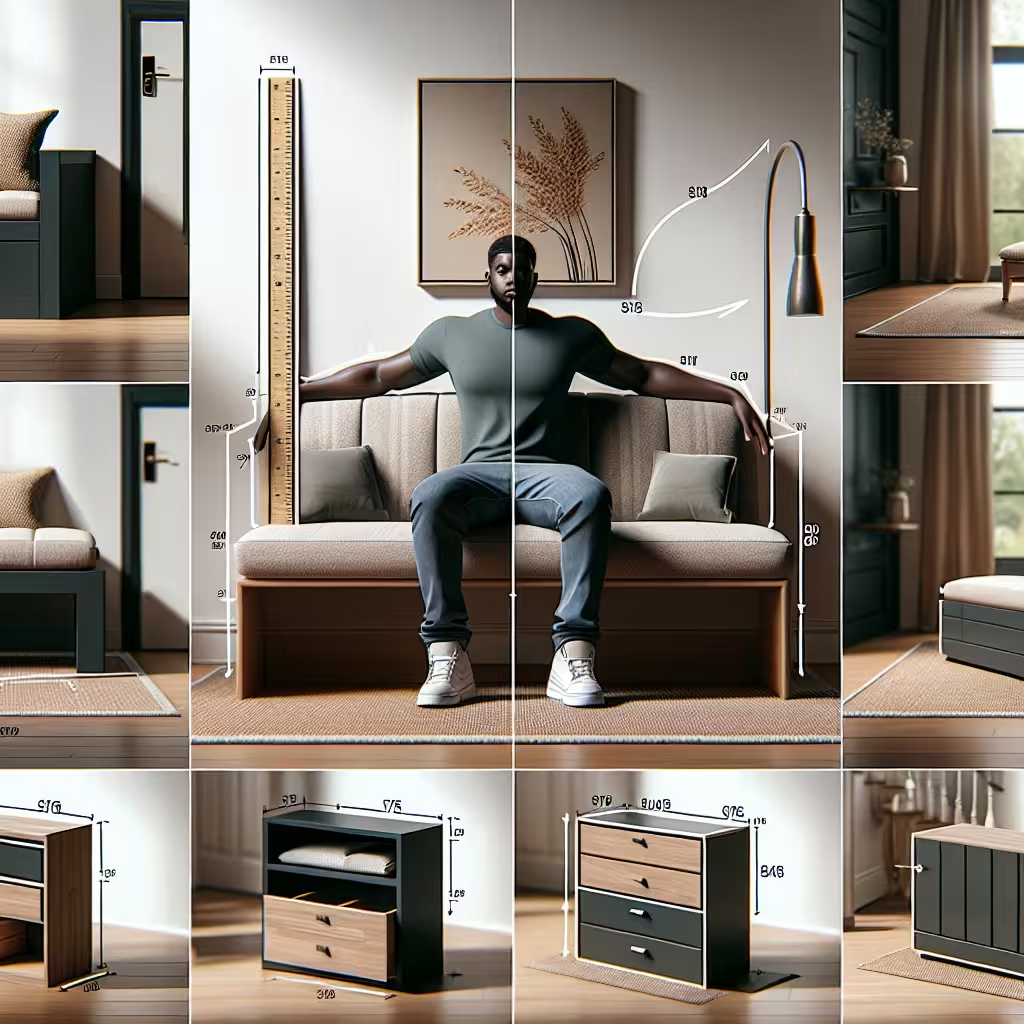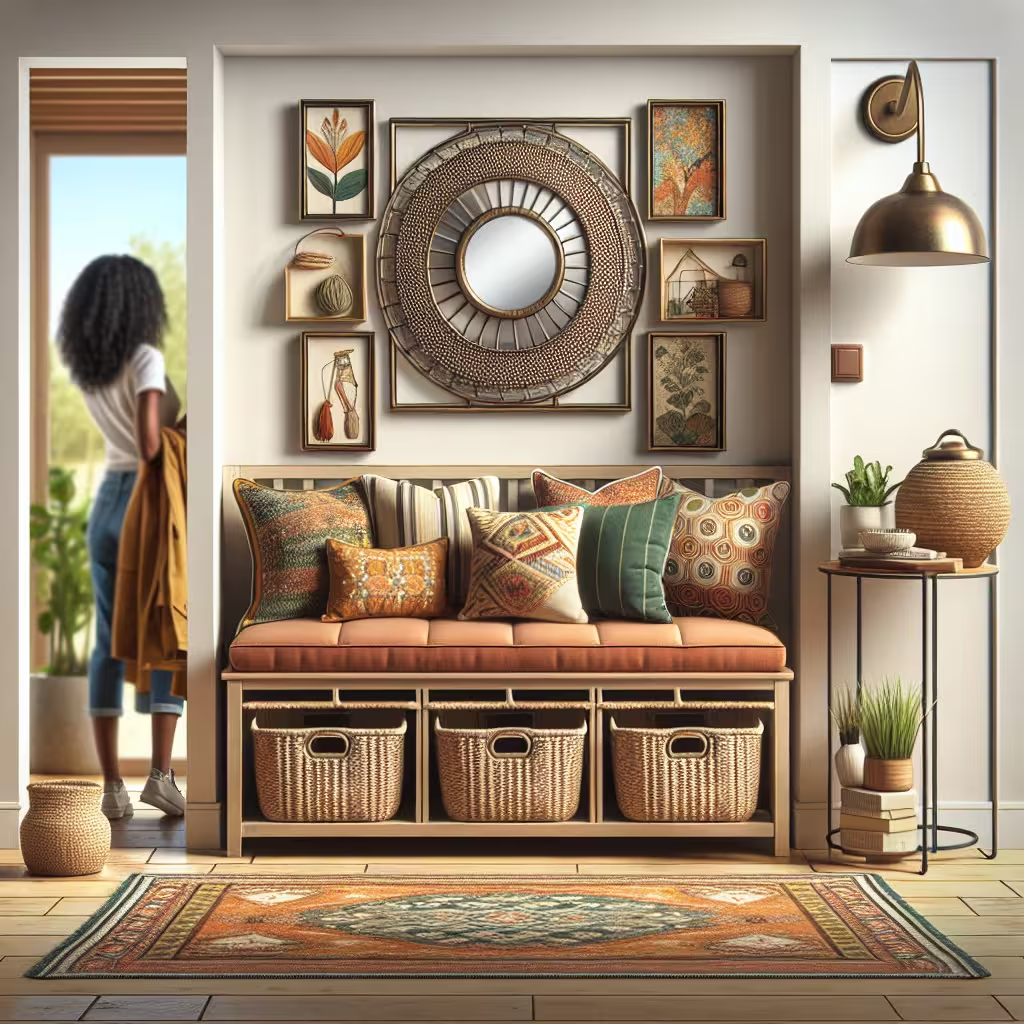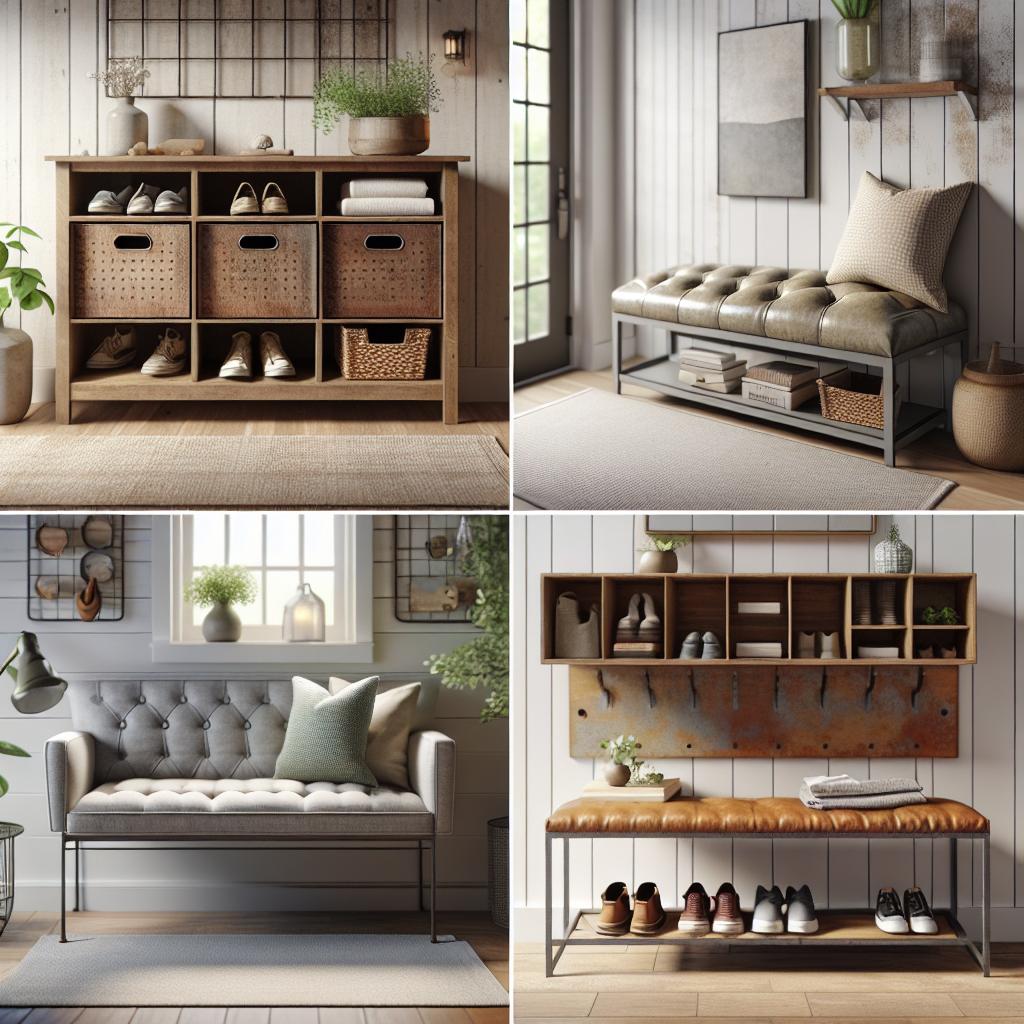As someone who’s spent years designing and optimizing entryways, I’ve seen firsthand how the right bench can transform a space from merely functional to truly welcoming. An entryway bench isn’t just a place to sit or store shoes – it’s an opportunity to create a warm first impression and set the tone for your entire home. By carefully considering your needs and space, you can choose a bench that not only looks great but also enhances your daily routines and interactions. Whether you’re looking to declutter, add seating, or simply make a style statement, I’m excited to guide you through selecting the perfect entryway bench to elevate your home’s entrance.
Reader Disclosure
Jump to:
Understanding Your Entryway Needs
Before diving into specific bench options, it’s crucial to assess your unique entryway situation and requirements. Consider the following factors:
Available Space
Measure your entryway carefully, noting the dimensions and any architectural features like doors, windows, or stairs that may impact bench placement. A bench that’s too large can overwhelm a small space, while one that’s too small may look out of place in a grand foyer.
Primary Functions
Think about how you’ll primarily use the bench. Do you need extra storage for shoes and accessories? Is seating a priority for putting on shoes? Or are you mainly looking for a decorative piece to enhance your entryway’s aesthetics?
Style and Decor
Your entryway bench should complement your home’s overall style. Whether your taste leans modern, traditional, rustic, or eclectic, there are bench options to suit every aesthetic.
Traffic Patterns
Consider how people move through your entryway. Ensure the bench doesn’t obstruct natural pathways or make the space feel cramped.
Climate Considerations
If you live in an area with harsh winters or frequent rain, you may want a bench with features like a shoe rack or storage for wet umbrellas.
Types of Entryway Benches
Now that you’ve assessed your needs, let’s explore the main types of entryway benches available:
1. Storage Benches
Storage benches are the multitaskers of the entryway world, offering both seating and hidden compartments for shoes, bags, and other items. They’re ideal for maximizing space efficiency in smaller entryways.
Pros:
- Dual functionality (seating + storage)
- Helps keep entryway clutter-free
- Various storage configurations available (lift-top, cubbies, drawers)
Cons:
- Can be heavier and more difficult to move
- May have limited seating capacity due to storage space
2. Shoe Storage Benches
Specifically designed to organize footwear, these benches often feature open shelves or cubbies beneath the seat.
Pros:
- Keeps shoes organized and easily accessible
- Prevents tracking dirt through the house
- Often includes a seat for putting on/taking off shoes
Cons:
- Limited storage for non-shoe items
- Open storage may not look as tidy as closed options
3. Upholstered Benches
Offering a softer, more luxurious look, upholstered benches add comfort and style to your entryway.
Pros:
- Comfortable seating
- Wide range of fabric options to match decor
- Can add a pop of color or texture to the space
Cons:
- May require more maintenance (cleaning, potential for stains)
- Often lack storage options
4. Wooden Benches
Classic and versatile, wooden benches come in a variety of styles from rustic to modern.
Pros:
- Durable and long-lasting
- Can complement various decor styles
- Often more affordable than upholstered options
Cons:
- May be less comfortable for extended sitting
- Limited color options compared to upholstered benches
5. Metal Benches
Sleek and modern, metal benches can add an industrial or contemporary touch to your entryway.
Pros:
- Durable and easy to clean
- Often lightweight and easy to move
- Can create a striking visual contrast
Cons:
- May be less comfortable without cushions
- Can feel cold or uninviting in certain settings
Key Features to Consider
When evaluating entryway benches, pay attention to these important features:
Size and Dimensions
Ensure the bench fits comfortably in your space, leaving enough room for foot traffic. A good rule of thumb is to leave at least 36 inches of clearance in front of the bench.
Weight Capacity
Consider how many people might sit on the bench simultaneously and choose one with an appropriate weight limit.
Material and Durability
Look for materials that can withstand daily use and are easy to clean, especially if you have children or pets.
Storage Options
If storage is a priority, compare different configurations like lift-top seats, drawers, or open shelves to find what works best for your needs.
Style and Aesthetics
Choose a bench that complements your existing decor and enhances your entryway’s overall look.
Comfort
If you plan to use the bench for seating frequently, consider factors like seat depth, cushioning, and back support.
Assembly Requirements
Some benches may require significant assembly, while others come pre-assembled. Factor in your DIY skills and available time.

Top Entryway Bench Picks for Different Needs
Based on extensive research and personal experience, here are some top entryway bench recommendations for various situations:
Best Overall: Pottery Barn Wade Bench
This versatile wooden bench offers a perfect blend of style, durability, and functionality. Its classic design suits various decor styles, and the solid wood construction ensures longevity.
Pros:
- Sturdy construction
- Timeless design
- Available in multiple finishes
Cons:
- Higher price point
- No built-in storage
Best Budget Option: VASAGLE Industrial Bench with Shoe Rack
For those seeking affordability without sacrificing style, this industrial-inspired bench offers great value. The built-in shoe rack adds practicality to its sleek design.
Pros:
- Affordable price
- Integrated shoe storage
- Industrial style complements many decors
Cons:
- Assembly required
- May not be as durable as higher-end options
Best for Small Spaces: Threshold Windham Entryway Bench
Compact yet functional, this bench is perfect for narrow entryways. Its slim profile and built-in storage make it an excellent space-saving solution.
Pros:
- Compact design
- Includes storage cubbies
- Attractive price point
Cons:
- Limited seating capacity
- May not suit larger entryways
Best Luxury Pick: West Elm Mid-Century Entryway Bench
For those willing to invest in a statement piece, this mid-century modern bench offers sophisticated style and premium craftsmanship.
Pros:
- High-quality materials
- Elegant design
- Comfortable upholstered seat
Cons:
- Expensive
- No storage options
Best for Families: Prepac Entryway Cubbie Bench
With multiple storage cubbies and a sturdy bench top, this option is ideal for busy households needing to organize shoes, bags, and other daily essentials.
Pros:
- Ample storage space
- Durable construction
- Versatile design
Cons:
- Bulky size may not suit all spaces
- Assembly required
Styling Your Entryway Bench
Once you’ve chosen the perfect bench, consider these styling tips to maximize its impact:
- Add cushions or pillows: Enhance comfort and inject color with decorative cushions or throw pillows.
- Incorporate storage baskets: Use attractive baskets or bins to organize smaller items and add texture to your entryway.
- Hang a mirror above: A mirror above your bench can make the space feel larger and provide a last-minute spot to check your appearance before leaving.
- Layer with a rug: An entryway rug can define the space and add warmth underfoot.
- Include ambient lighting: A table lamp or wall sconce near your bench can create a welcoming atmosphere.

Maintenance and Care
To keep your entryway bench looking its best:
- Regular cleaning: Dust and vacuum regularly, and wipe down surfaces with appropriate cleaners for the material.
- Address spills promptly: Especially important for upholstered benches to prevent staining.
- Tighten hardware: Periodically check and tighten any loose screws or bolts.
- Rotate cushions: If applicable, rotate cushions to ensure even wear.
- Seasonal care: Consider applying wood conditioner to wooden benches annually or as needed.
Environmental Considerations
When selecting an entryway bench, consider its environmental impact:
- Sustainable materials: Look for benches made from sustainably sourced wood or recycled materials.
- Durability: Choose well-made pieces that will last for years, reducing the need for frequent replacements.
- Local production: When possible, opt for benches produced locally to reduce transportation emissions.
- End-of-life considerations: Consider how the bench can be recycled or repurposed when it’s no longer needed.
People Also Ask
How tall should an entryway bench be?
The ideal height for an entryway bench is typically between 17-20 inches. This range allows for comfortable seating while putting on or taking off shoes.
Can I use an outdoor bench in my entryway?
While possible, it’s best to choose a bench specifically designed for indoor use. Outdoor benches may not match interior decor and could introduce dirt or moisture into your home.
How do I protect my floor from an entryway bench?
Use felt pads or rubber feet on the bench legs to prevent scratching. For added protection, place a rug under the bench.
Conclusion
Choosing the right entryway bench can significantly enhance your home’s functionality and style. By carefully considering your space, needs, and personal taste, you can select a bench that not only serves its practical purpose but also creates a welcoming atmosphere for you and your guests. Remember, the perfect entryway bench is an investment in both your home’s aesthetics and your daily comfort. Take your time, explore your options, and enjoy the process of finding the ideal bench to greet you every time you come home.
Show & Tell
We’d love to hear your thoughts about these ideas! Simply click the link to head over to your favorite platform and add your comments about this post there. We’d like to know about your insights, questions, or just saying hi.
Disclosure
Our content is reader-supported. This means if you click on some of our links, then we may earn a commission. Commissions do not affect our editor’s opinions or evaluations. Learn more about our editorial process.

About the Editorial Staff
The Curvspace editorial team comprises a diverse group of experts on intermediate and threshold spaces in homes and workplaces. Architects and interior designers, civil engineers and artists, environmental and behavioral psychologists, sociologists and anthropologists. All collaborate to create helpful content, that explores the full potential of these often-overlooked areas to enhance our daily lives.


